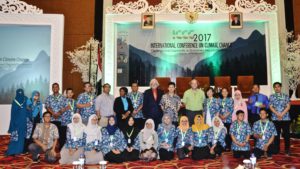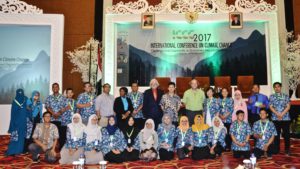International tourism consultant Mr. MacGregor told eTN: “I have shifted my focus from sustainable tourism and even low carbon tourism towards implementation of those adaptive techniques that will reduce the impacts of global warming on destinations including urban heat islands, rising sea levels, hurricanes and flooding, loss of biodiversity and other factors that will significantly impact the tourism industry.
It’s important to realize that rapidly rising CO2 levels and the subsequent global warming are more or less “locked in” in for the next 70 years.
In other words, all efforts by the travel industry to reduce CO2 will only have a very marginal impact.
International researchers specializing in assessing the impact of climate change wrapped up a 3-day conference on climate change this week. The conference, held in Solo City, Central Java, Indonesia, was organized by the Universitas Sebelas Maret in collaboration with universities in Germany, Japan and Malaysia.
Conference organizer, Dr. Komariah, identified this second International Conference on Climate Change, (ICCC) as: “both an opportunity to bring together the results of advanced international research but also as an opportunity for our graduate students to present their research findings”.
Research presentations on the impacts of global warming pertained to several industries including tourism, agriculture, and forestry.
International sustainable tourism consultant, James MacGregor, from Morocco, delivered the keynote address and particularly spoke about both the impacts of significant increases in temperatures on major urban tourism destinations and of rising sea levels and flooding on coastal tourism zones.
Mr. MacGregor noted in his opening statement that; “I have been following climate change impacts for the past 20 years and have spent most of my efforts identifying practices to reduce CO2 emissions in the travel industry. However current research indicates that major urban tourism destinations will become unbearably hot during the summer months and coastal resorts will be threatened by 1.5 – 2 m sea rises within the next 40 – 50 years. Fortunately, both these potentially disastrous conditions are manageable if we immediately implement specific adaptive measures and techniques”.
Similar significant impacts where identified by researchers such as Dr. Dodo Gunawan of the Indonesian Agency for Meteorology Climatology and Geophysics who identified rising sea surface temperatures, typhoon (hurricane) probability, changing rainfall patterns and other climate trends throughout southeast Asia.
Dr. Takeo Onishi from Gifu University in Tokyo, Japan, reinforced the nature of these impacts by identifying the degradation of water quality as a result of climate change induced alteration to land cover.
Dr. Anthony Kennedy, of Victoria University in Australia, presented his work in small rural communities which will be dramatically affected by climate change, particularly those that rely on agriculture and tourism. However, initiatives with local stakeholders suggests that community resilience is in fact possible based on knowledge of the impending impacts and potential adaptive solutions.
Again, Mr. MacGregor demonstrated that measures can be taken to ensure that impacts can be minimized. For instance, “summer temperatures in New York City, Jakarta or Paris do not need to become similar to Dubai by, say, 2060, as current projections indicate. But that would include immediate planting of shade trees and installing roof gardens and even green walls”. He noted that the city of Toronto has recently passed a by-law requiring all new buildings in the city to include a roof garden.
As well, he proposed numerous coastal zone applications, including the construction of “living dunes” and dune reconstruction, mangrove plantings, re-establishing coral reefs as well as natural dikes and reconstructed wetlands. “These initiatives and others will not necessarily protect all coastal resort properties but if the techniques are applied immediately it will be possible to protect billions of dollars of vulnerable tourism facilities and associated infrastructure”.
The conference declaration was ambitious. Researchers and planners drafted a proposal and will solicit funding to immediately start on the preparation of a ‘Java Climate Change Adaptive Action Plan (2020-2050) Model’ to protect the islands’ resources, including Jakarta, from the inevitable
Currently reading:
145



